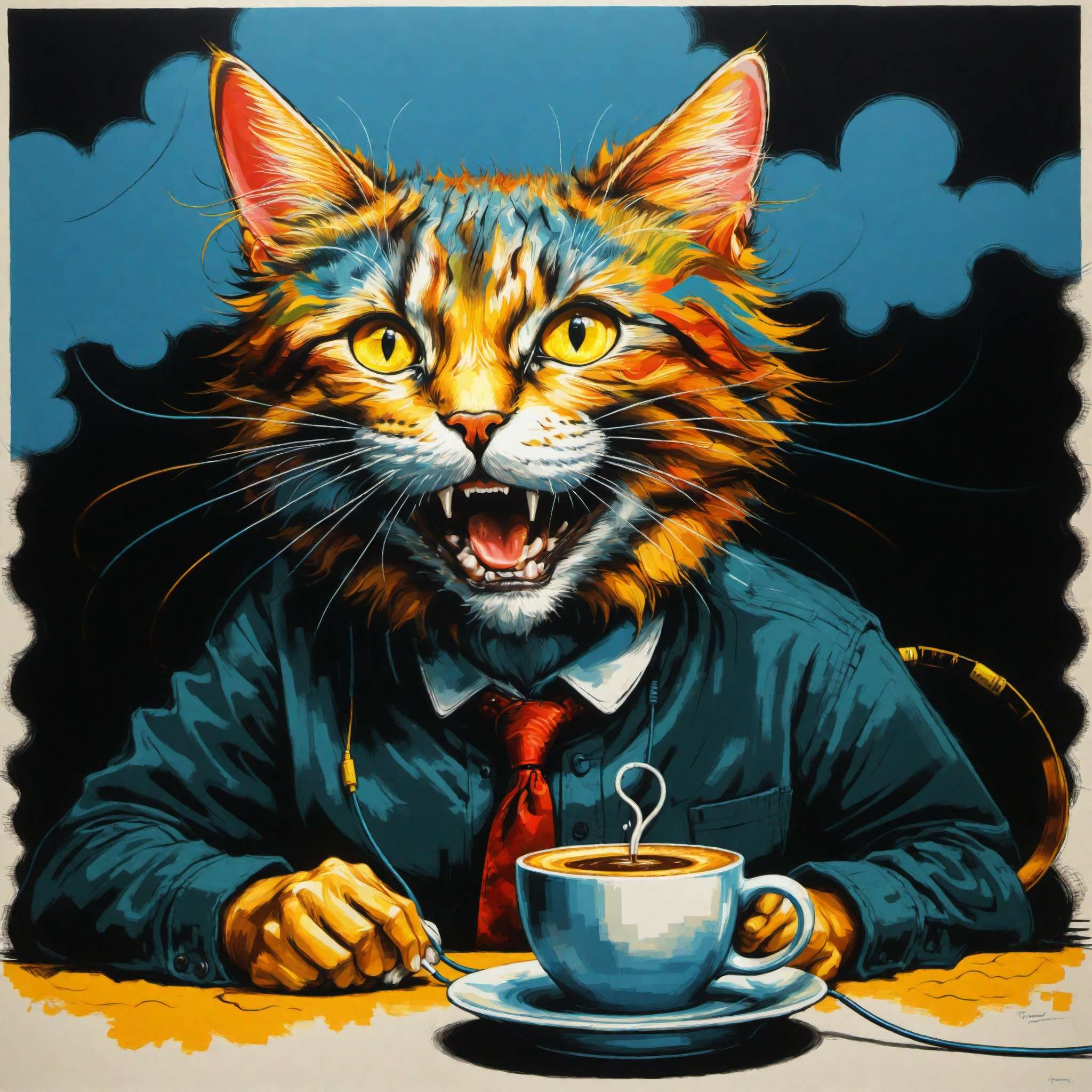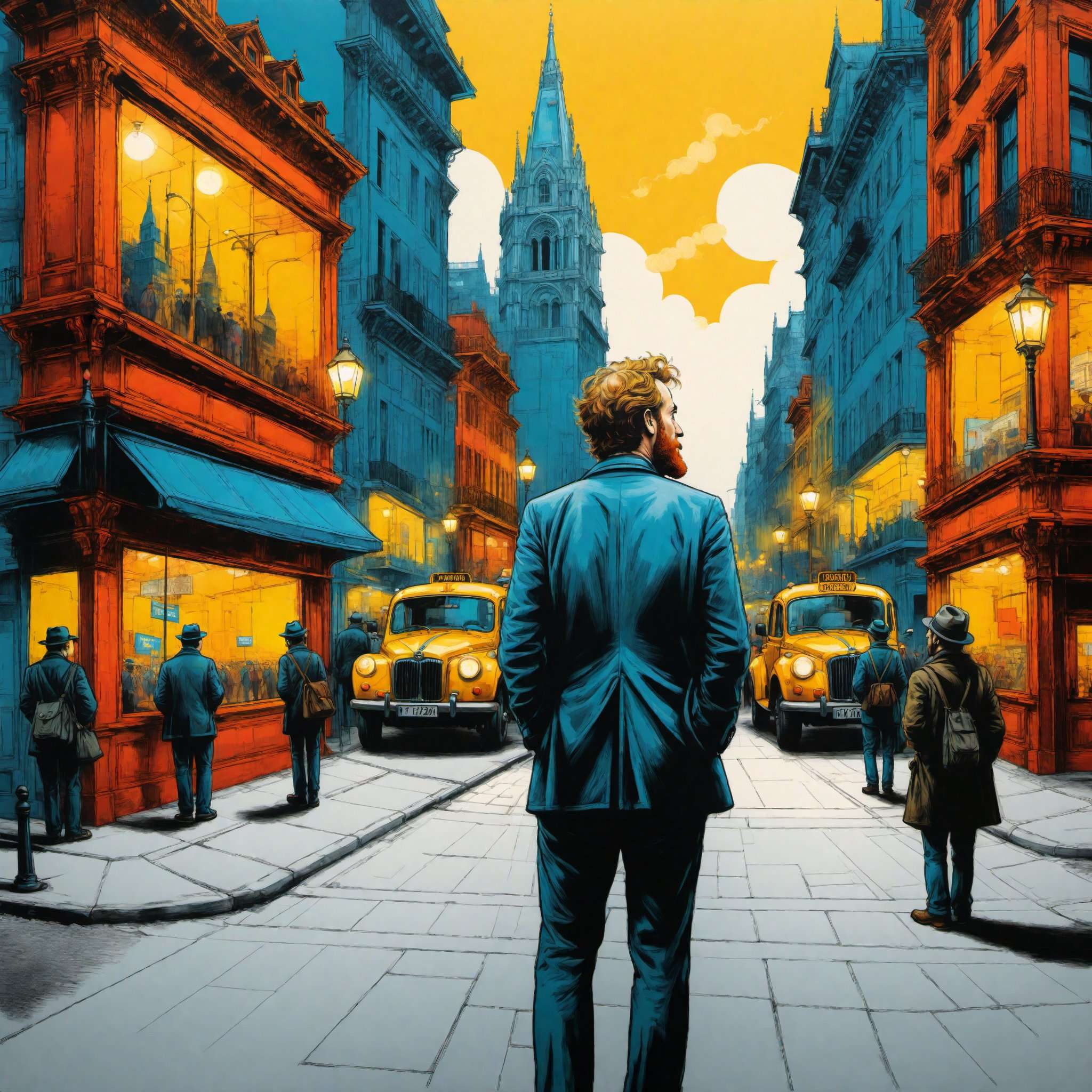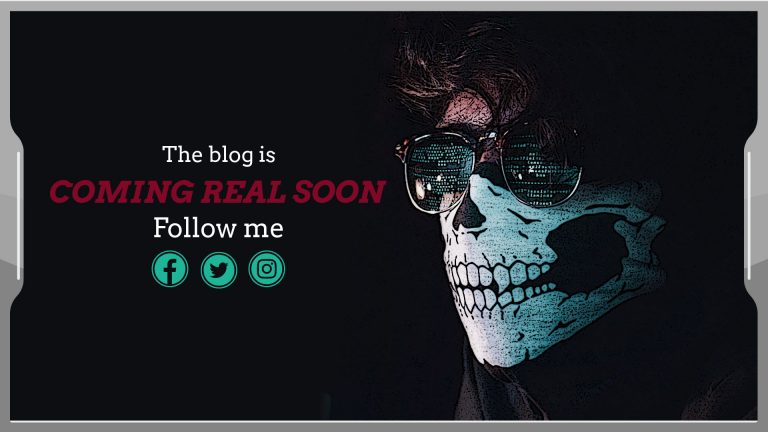Zombie Bunny is Reader-supported and may earn an affiliate commission through links on our site.

10 Hilarious Things That Only Happen to Everyone
Get ready to laugh out loud with our compilation of 10 universally funny moments. Discover the humor in everyday life. #FunnyMoments #EverydayHumor
Embark on a laughter-filled journey as we explore the universal comedy of life in our blog post. From tripping over thin air, mispronouncing words, to mishearing phrases that lead to hilarious misunderstandings, we’re diving into those universally hilarious incidents that happen to everyone. Prepare to chuckle, giggle, and maybe even snort as we dissect everyday mishaps, reminding us that humor is not exclusive, but inclusive, allowing us all to share in the joy of a good laugh. So, buckle up and get ready for a laughter-filled exploration of the 10 hilarious things that only happen to everyone.
Introduction: The Universal Comedy of Life

© Copyright , ZombieBunny.Org
Introduction to the concept of universal hilarity
There is a unique brand of humor that everyone, regardless of age or background, can relate to. We call this the concept of universal hilarity. It’s the kind of laughter that stems not from a well-crafted joke or a clever play on words but from the everyday mishaps and oddities that we all experience.
These moments of laughter are unexpected and unplanned, making them even more enjoyable. They occur in the most mundane situations, turning ordinary instances into extraordinary memories. This universal hilarity is a reminder that humor is not exclusive but inclusive, allowing us all to share in the joy of a good laugh.
Life, with all its twists and turns, often serves up the most comedic moments. These are not crafted by a stand-up comedian or scripted in a sitcom, but they are real, raw, and universally hilarious. So, as we delve into these ten hilarious things that happen to everyone, remember: laughter is the common language we all speak.
Everyday life is filled with these universally hilarious moments. They punctuate our daily routines with bursts of laughter, reminding us of the lighter side of life. As we navigate through the ten hilarious things that only happen to everyone, we celebrate the beauty of shared experiences and the unifying power of laughter. Prepare to chuckle, giggle, and maybe even snort as we explore the universal comedy of life.
An overview of what the article entails
In this blog post, we will embark on a journey exploring the universal comedy of life, those hilarious incidents that everyone experiences. We all have humorous stories of tripping over thin air, forgetting a word mid-sentence, or mispronouncing a word in a way that even we can’t help but giggle. These are the shared laughs, the common threads that tie us all together in the fabric of life.
Each section of this blog will delve into a separate, universally hilarious experience. From the absurdity of sneezing at the most inopportune moments to the amusement of finding an unexpected item in the bagging area at the supermarket, we’ll dissect the humor within. We’ll also touch on the comedy that arises when we mishear things, resulting in the most outlandish interpretations, or when we accidentally photobomb a stranger’s picture.
The blog spotlights those everyday incidents that make us chuckle, bringing a lighthearted touch to our otherwise routine lives. Amid the hustle and bustle of daily life, these moments serve as a timely reminder to embrace the hilarity that life throws our way.
As you read through each section, you’ll likely recognize your own experiences, causing a chuckle or an outright belly laugh as you relate to each scenario. The joy in this journey resides in the shared experience of these moments, reminding us of the connectedness and the universal hilarity that binds us all together.
A brief tease of the 10 hilarious things
Let’s give you a sneak peek of the humor-filled journey we’re about to embark on. Imagine you’re walking down the street, absorbed in your thoughts, when suddenly you trip over…nothing? Yes, that’s right. We’ve all been there, and it’s our first universally hilarious thing. Next, we’ll touch on the humor of accidental self-injury – that moment when we’ve all cut a finger while chopping vegetables and tried to play it cool.
We also dive into the comedy of forgetting a word mid-sentence. There’s nothing quite like the blank look of confusion that takes over when our brains decide to take a mini vacation. And who hasn’t misheard a phrase, leading to a hilarious misunderstanding that gets everyone laughing?
The blog also explores the universal humor of the unexpected item in the bagging area, a scenario synonymous with modern grocery shopping. We’ll laugh about the accidental photobomb, the ill-timed sneeze, the mispronounced word, and the classic scenario of spilling something on ourselves at the most inopportune times.
Finally, we’ll round off our list with the hilarity that ensues when we get lost in places we should know like the back of our hands. It’s a journey filled with laughter, a nod to the shared human experience, and a celebration of the universal comedy of life. So, buckle up and get ready for a laughter-filled exploration of the 10 hilarious things that only happen to everyone.
1. The Unavoidable Moment of Tripping Over Nothing

© Copyright , ZombieBunny.Org
Explanation of the tripping phenomenon
Tripping over nothing is an experience that we’ve all had at least once. It’s a moment of pure slapstick comedy; one minute you’re walking along, minding your own business, and the next, you’re stumbling over an invisible obstacle. There’s no banana peel, no pavement crack, just the mysterious forces of the universe conspiring to give you a moment of unexpected clumsiness.
The tripping phenomenon can strike at any time and anywhere. It could be when you’re walking down a crowded street, crossing a room, or even just standing still. It’s as if your foot suddenly decides to rebel against the rest of your body, causing you to stumble, stagger, and sometimes even take a stumble.
This seemingly odd phenomenon has a simple explanation. Our brains are constantly multitasking, juggling multiple tasks at once. Sometimes, amidst all this juggling, our brain may momentarily forget to coordinate our steps, leading to the infamous trip over nothing.
But there’s more to this phenomenon than just a lapse in brain coordination. It’s a shared experience that brings us all together, a universal comedic moment that transcends language and culture. It’s a testament to our shared human experience, reminding us that we’re all prone to moments of hilarity, even in our most mundane actions. So, the next time you trip over nothing, remember, you’re not alone. We’re all part of this universal comedy of life.
Anecdotes and examples
One need not look far for anecdotes and examples of this universal tripping phenomenon. We’ve all been there – walking with a cool gait, perhaps even swinging our arms for added swagger, when suddenly we stumble. Our arms flail, our coolness evaporates, and we’re left looking around, hoping no one noticed our impromptu dance with gravity.
Take John, for instance, a friend who once tripped over nothing while descending a flight of stairs. There was no loose shoelace, no misplaced step, just a sudden stumble that sent him sprawling down the staircase. Luckily, he wasn’t hurt, but the incident left him – and everyone who witnessed it – laughing.
And then there’s the story of Mary. She was striding confidently across her office, ready to deliver a crucial presentation, when she tripped over thin air. With papers flying everywhere and co-workers stifling their giggles, it was a memorable start to her presentation. But Mary, ever the professional, simply laughed it off and carried on, earning herself a round of applause.
These examples highlight the spontaneous and unpredictable nature of the tripping phenomenon. It can strike at any moment, turning routine activities into moments of unexpected hilarity. And while it might dent our pride momentarily, it also serves as a reminder to laugh at ourselves and enjoy the comedy that life invariably throws our way. After all, stumbling over nothing is a part of the universal comedy of life.
Why it’s universally hilarious
The reason why tripping over nothing is universally hilarious lies in its unexpected and inexplicable nature. It’s a sudden, unanticipated event that disrupts the normal flow of things. And as with most comedic moments, the element of surprise plays a crucial role. The spontaneous, unscripted nature of the stumble is what often makes it funny.
Moreover, the tripping phenomenon is universally hilarious because it’s relatable. Everyone, from a toddler learning to walk to a seasoned athlete, has experienced this stumble. It’s a shared human experience, an amusing reminder of our commonality and fallibility.
The humor also lies in the absurdity of the situation. Tripping over a visible obstacle, like a stone or a toy, is one thing, but tripping over nothing? The sheer absurdity of stumbling over an imaginary obstacle brings about spontaneous laughter, the kind that bubbles up from deep within and is infectious.
Finally, the comedy of the tripping phenomenon is in its aftermath. The startled look, the quick recovery, the sheepish grin, and the inevitable glance around to see if anyone noticed – all add to the humor of the situation. It’s a brief moment of shared amusement, a collective chuckle that lightens the mood and brings people together. The tripping phenomenon, in its own funny way, reminds us to take life a little less seriously and to find humor in our shared human experiences.
2. The Universal Language of Accidental Self-Injury

© Copyright , ZombieBunny.Org
Exploring the humor in accidental self-injury
Accidental self-injury, while not always a laughing matter, has its moments of hilarity. It’s not the injury itself that’s funny, of course, but rather the absurdity of the situation and our reactions to it. It’s that moment when we’re cutting vegetables and the knife slips, or when we’re walking into a room and bump into a door we’ve passed through a thousand times.
Humor in accidental self-injury arises from the unexpectedness of the situation. There’s something inherently funny about a sudden, surprising event that disrupts our normal routine. It’s the surprise element that often triggers laughter. When we’re going about our day, focused on our tasks, and suddenly something goes awry, the abrupt shift from normal to abnormal can tickle our funny bone.
Another aspect of humor in accidental self-injury lies in our reactions. There’s a certain comedy in the way we react to these minor mishaps. We might let out a yelp, jump back in surprise, or even start laughing at our clumsiness. This immediate, spontaneous reaction adds an element of surprise, enhancing the humor of the situation.
The humor in accidental self-injury is also a form of coping mechanism. Laughter, after all, is often the best medicine. By finding humor in these situations, we’re able to mitigate the embarrassment or discomfort we might feel. So while accidental self-injury is universally experienced, it’s our ability to laugh at ourselves that makes it universally hilarious.
Illustrative stories and examples
Let’s explore some illustrative stories and examples of accidental self-injury. Meet Tom, a do-it-yourself enthusiast. One sunny Saturday, he decided to fix a loose shelf in his garage. Armed with a hammer and nails, he started his project with gusto. But in his excitement, he missed the nail and hit his thumb instead. After a wince and a loud yelp, he started laughing, realizing the comedy in his predicament.
Then there’s Sarah, a professional chef known for her knife skills. One day, while demonstrating how to finely chop onions, her knife slipped, and she nicked her finger. Instead of panicking, she laughed it off and jokingly warned her audience, “Don’t try this at home!” Her humor amidst the mishap only enhanced her audience’s admiration for her.
Or consider Mike, an avid runner. One morning while out for his run, he was so engrossed in his podcast that he didn’t notice a low-hanging branch. He ran right into it, causing him to stumble. He quickly picked himself up, laughing at his own clumsiness, and continued on his run, a little more alert.
These stories illustrate that accidental self-injury can happen to anyone, at any time. They’re random, spontaneous, and often funny because of their absurdity. But more importantly, they show that our ability to laugh at ourselves in these moments is what truly makes them universally hilarious.
Reasons for its universal appeal
The humor in accidental self-injury has a universal appeal because it’s a shared human experience. No matter who we are or where we’re from, we’ve all had moments where we’ve unintentionally hurt ourselves in the most absurd ways. This shared experience, coupled with the surprising nature of these incidents, is the foundation of its universal appeal.
Another reason for its universal appeal is the element of surprise. Accidental self-injury is almost always unexpected, and as with many comedic moments, the surprise element is a key factor. When we’re caught off guard, our reactions are often spontaneous and genuine, contributing to the humor of the situation.
Additionally, these moments are often relatable, making them universally funny. We laugh because we see ourselves in these situations. We’ve all had a clumsy moment, a slip of the hand, or a misjudged step. When we see others experience the same, it resonates with our own experiences, making us laugh.
Finally, the humor in accidental self-injury is a form of social bonding. Laughter is a social act, and when we share a laugh over a common experience, it brings us closer together. It’s a reminder that we’re all human, all prone to mistakes, and all able to find humor in our mishaps. This shared laughter, born out of shared experiences, is what makes the humor in accidental self-injury universally appealing.
3. The Comedy of the Forgotten Word Mid-Sentence

© Copyright , ZombieBunny.Org
Understanding the forgotten word phenomenon
We’ve all been there. Engrossed in a conversation, making a crucial point, when suddenly, the perfect word we need to complete our sentence disappears from our mind. It’s as if it’s been swallowed up by a black hole, leaving us stuttering, stammering, and searching for the elusive word. This is what we call the forgotten word phenomenon.
The forgotten word phenomenon is a universal experience. It doesn’t matter how eloquent or verbose we might be, there will be times when words simply escape us. It could be the name of a familiar object, the perfect adjective to describe something, or even the name of a person we’ve known for ages.
So, why does this happen? Well, our brains process an enormous amount of information each day. In the hustle and bustle of our thoughts, sometimes, some words take a temporary leave of absence, leading to these humorous, blank moments.
What makes the forgotten word phenomenon universally hilarious is its sudden and unexpected nature. We’re cruising along in our conversation, confident and articulate, when suddenly we hit a verbal roadblock. It’s this sudden shift from fluency to floundering that triggers laughter. So the next time you find yourself grappling for a forgotten word, remember, it’s all part of the universal comedy of life. Everyone, at some point or another, has been a victim of the forgotten word phenomenon.
Stories and examples
Let’s delve into some stories and examples of the forgotten word phenomenon. Picture this: you’re at a dinner party, regaling the table with a captivating story. You’re nearing the climax, everyone’s hanging onto your every word, and then, poof! The crucial word you needed vanishes from your mind. You scramble, you fumble, and then you laugh, as the table joins you in your mirth.
Or consider the tale of Lisa, a teacher known for her articulate speeches. During a school assembly, while delivering an inspiring message, she momentarily forgot the word ‘perseverance’. She paused, chuckled, and confessed to her momentary memory lapse, much to the amusement of her students.
And who can forget the story of Mike, a seasoned salesman? During an important pitch, he forgot the name of his product mid-sentence. After a stunned silence, he laughed and made a joke about needing more coffee, diffusing the situation with humor.
These examples highlight the unpredictable nature of the forgotten word phenomenon. It strikes without warning, turning eloquent speakers into stuttering, stammering messes. But it’s not the forgetfulness that we laugh at, it’s the unexpected disruption, the sudden shift from fluency to floundering that tickles our funny bone.
So, the next time you forget a word mid-sentence, remember these stories. Embrace the momentary lapse, laugh it off, and know that you’re not alone. After all, the forgotten word phenomenon is a universally hilarious part of life.
Why it resonates with everyone
The forgotten word phenomenon resonates with everyone because it’s a shared human experience. It’s not exclusive to any age, profession, or language. Whether we’re a seasoned speaker or a shy introvert, we’ve all had those moments when a word slips from our grasp just when we need it the most. This shared experience is what makes the phenomenon universally relatable and, therefore, universally hilarious.
The comedy of the forgotten word phenomenon also lies in its randomness and unpredictability. We never know when a word might decide to play hide and seek with us. This element of surprise adds a layer of humor to the situation. There’s nothing quite like watching someone smoothly sail through a sentence, only to stumble at the last word. It’s this unexpected shift from confidence to confusion that triggers laughter.
Furthermore, this phenomenon resonates because it’s a gentle reminder of our fallibility. No matter how articulate or knowledgeable we may be, we’re all prone to moments of forgetfulness. It’s a humbling, humanizing experience, reminding us that it’s okay to make mistakes and laugh at ourselves.
Finally, the forgotten word phenomenon resonates because it’s a testament to our ability to find humor in awkward situations. Life is filled with unexpected curveballs, and our ability to laugh at these minor stumbles is what makes the journey enjoyable. So, when words fail us, laughter is there to fill the gap.
4. The Hilarity of Mishearing Things

© Copyright , ZombieBunny.Org
Exploring the concept of mishearing things
Mishearing things is a common occurrence that often results in some of the most hilarious moments in our lives. It’s when our ears play tricks on us, causing us to hear something entirely different from what was actually said. From song lyrics to everyday conversations, the potential for mishearing is everywhere.
The concept of mishearing things, also known as a mondegreen, is a universal source of humor. It can happen in any situation where communication is involved, making it a common occurrence in our daily lives. The funniest part is that we often don’t realize our mistake until someone points it out or we notice the baffled expressions of those around us.
The comedy in mishearing lies in the unexpected and often absurd interpretations that result. For instance, you might hear someone say, “I can’t bear to see you cry” as “I can’t bear to see your pie.” The result is a hilarious twist that adds a dash of humor to everyday conversations.
Mishearing things is a testament to our brain’s remarkable ability to fill in gaps based on context, even when it leads us astray. It’s a reminder that our perception of reality is subjective and prone to amusing errors. So, the next time you mishear something, don’t be embarrassed. Laugh it off and enjoy the humor in the situation. After all, mishearing things is a part of the universal comedy of life.
Anecdotes and examples
Let’s look at some anecdotes and examples of mishearing things. Take Sam, for instance. He was at a dinner party when he overheard a woman say, “I love cooking my family and my pets.” Shocked, he asked her to repeat herself, only to realize that she had actually said, “I love cooking, my family, and my pets.” The misplaced comma in his interpretation had led to a hilariously morbid misunderstanding.
Or consider the classic example of mishearing song lyrics. Lisa, a music enthusiast, spent years singing “Sweet dreams are made of cheese” instead of “Sweet dreams are made of this.” She only discovered her hilarious mistake during a karaoke night, much to the amusement of her friends.
Then there’s Mike, who misheard his boss during a meeting. His boss, discussing the budget, said, “We need to cut the fat.” Mike, however, heard it as “We need to cut the cat,” leading to a moment of confusion and subsequent laughter.
These examples highlight the comedy that ensues when we mishear things. They show that our ears, just like our brains, can play tricks on us, leading to amusing misunderstandings. So, the next time you mishear something, remember these stories, laugh it off, and know that you’re part of a universal comedy that everyone can relate to.
The universal appeal of this humor
The humor in mishearing things has a universal appeal because it’s a shared human experience. Regardless of our background, language, or culture, we’ve all misheard something at some point. This shared experience, coupled with the surprising and often absurd interpretations that result, makes the humor universally relatable and enjoyable.
Another reason for its universal appeal is the spontaneous nature of mishearing. The humor arises from the unexpected, creating a surprise element that often triggers laughter. It’s the sudden realization of our mistake and the amusing contrast between what we thought we heard and what was actually said that makes us chuckle.
Moreover, the humor in mishearing things is a form of social bonding. When we share a laugh over a misunderstood phrase or misheard lyric, it brings us closer together. It’s a reminder that we’re all human, all prone to mistakes, and all able to find humor in our errors.
Finally, this type of humor appeals to our love for storytelling. Misheard phrases and lyrics often make for amusing anecdotes that we can share with others. They’re stories that can be retold over dinner tables and in social gatherings, spreading laughter and joy.
In conclusion, the humor in mishearing things resonates with everyone because of its universal occurrence, spontaneous nature, and social bonding aspect. It’s a part of the universal comedy of life that brings us all together.
5. The Joke of the Unexpected Item in the Bagging Area

© Copyright , ZombieBunny.Org
Discussing the unexpected item joke
There’s a universally hilarious scenario that anyone who’s ever used a self-checkout system can relate to – the unexpected item in the bagging area. You’re scanning your groceries, everything is going smoothly, and then suddenly, the machine halts your progress with a stern warning: “Unexpected item in the bagging area.” You look down, but there’s nothing out of place. It’s a phantom item, a ghost in the machine, causing a comic disruption in your shopping experience.
The unexpected item joke has become a part of our shared cultural humor, particularly in the age of self-service checkouts. It’s a moment of absurdity that breaks the monotony of our routine shopping trips. The machine, designed for efficiency and convenience, suddenly throws a wrench in the works for no apparent reason.
The comedy lies in the unexpectedness of the situation. It’s a curveball thrown at us by a machine, disrupting our flow and leaving us bemused. It’s the machine’s certainty against our confusion that creates the humor. As we frantically search for the offending item, we can’t help but laugh at the absurdity of the situation.
Moreover, the unexpected item joke is universally hilarious because it’s a shared experience. Regardless of where we are, anyone who’s used a self-checkout system has likely encountered this message. It’s a testament to our shared human experience in a digital age, a modern twist in the universal comedy of life.
Illustrations and examples
Let’s delve into some illustrations and examples of the unexpected item joke. Picture yourself in a bustling supermarket on a busy Saturday. You’re at the self-checkout, scanning your groceries when suddenly, the machine blares out, “Unexpected item in the bagging area.” You check your bags, but everything is in order. The customers in line behind you are chuckling, and even the store assistant can’t help but smile as they come over to assist.
Or consider the story of Jane. She was at her local supermarket, rushing to get her shopping done during her lunch break. Just as she was about to finish, the unexpected item warning flashed on the screen. Despite her initial annoyance, she couldn’t help but laugh at the situation, even as she frantically searched for the nonexistent item.
And then there’s Mike, who was shopping for a dinner party. Just as he was about to pay, the unexpected item warning sounded. Looking around, he realized he had accidentally scanned his car keys. The incident made for a great dinner party anecdote later that evening.
These examples highlight the humor in the unexpected item scenario. They show that even in our mundane routines, there’s room for a dash of comedy. It’s a reminder that laughter can be found in the most unexpected places, even in the bagging area of a self-checkout machine.
Why it’s universally funny
The unexpected item joke is universally funny because it’s a shared experience that most of us can relate to. Regardless of the grocery store or the country, the unexpected item warning at a self-checkout is a common occurrence. This shared experience, combined with the absurdity of the situation, makes it universally humorous.
Another factor contributing to its universal humor is the element of surprise. The unexpected item warning usually comes when we’re smoothly navigating the self-checkout, creating a sudden, amusing disruption. This surprise element, a key ingredient in humor, adds a layer of comedy to our otherwise routine shopping experience.
The humor also lies in the machine-human interaction. The machine, with its unyielding insistence on the presence of an unexpected item, against the human, who can clearly see there’s nothing amiss. It’s this juxtaposition of machine certainty and human confusion that creates a comical situation.
Finally, the unexpected item joke is universally funny because it’s a form of social bonding. When we share a laugh over a common experience, it brings us closer together. It’s a reminder that we’re all human, all prone to the whims of technology, and all able to find humor in our daily experiences. So, the next time you hear the unexpected item warning, remember, it’s all part of the universal comedy of life.
6. The Amusement of the Accidental Photobomb

© Copyright , ZombieBunny.Org
Understanding the photobomb phenomenon
The photobomb phenomenon is a universal source of amusement that most of us have either experienced or witnessed. It’s that hilarious moment when someone or something unexpectedly appears in the background of your photo, turning a regular snapshot into an amusing memory. From a passerby making a funny face to a pet sneaking into the shot, the photobomb has become a staple in the comedy of everyday life.
Understanding the photobomb phenomenon involves appreciating the spontaneity and unpredictability it brings to photography. In a world where we often curate our photos to capture the ‘perfect’ moment, the photobomb injects an element of surprise and humor. It’s a reminder that life is full of unexpected moments that often make for the best memories.
The hilarity of the photobomb lies in the contrast it creates. You might be posing for a serene sunset photo, only to find a dog chasing its tail in the background. Or you could be taking a serious group photo, unknowingly photobombed by a friend pulling a funny face. The resulting contrast between what we intended to capture and what we actually captured is what makes photobombs universally funny.
Furthermore, the photobomb phenomenon is a testament to our shared human experience. Regardless of where we are in the world, the potential for an unexpected photobomb exists. It’s a shared source of amusement, a collective laugh at the unpredictability of life, making it a universally hilarious phenomenon.
Storytelling and examples
Let’s delve into some storytelling and examples of the accidental photobomb. Picture Jenna, who decided to take a selfie at a bustling city square. She took the perfect shot, only to realize later that a man in the background was mirroring her pose, creating a hilarious double selfie.
Or consider the story of Tom. He was traveling and took a beautiful photo of a historic monument. Only when he looked at the photo later did he notice a squirrel in the foreground, seemingly posing for the camera, turning his serious shot into a funny memory.
And who can forget the classic group photo scenario? Lisa was at a family reunion and organized everyone for a group picture. When she looked at the photo later, she spotted her young cousin making a funny face in the background, transforming the formal family photo into a candid, comical snapshot.
These examples highlight the universal humor of the accidental photobomb. They show that no matter how much we plan our photos, there’s always room for a surprise element that can turn any regular snapshot into a hilarious memory. So, the next time you’re taking a photo, keep an eye out for potential photobombers. They might just make your photo a universally funny memory to cherish.
The universal humor of photobombs
The universal humor of photobombs lies in their unexpected and spontaneous nature. In a world where we often strive for picture-perfect moments, photobombs add an element of surprise and authenticity that makes them universally funny. They disrupt our carefully planned photos with a dose of reality, reminding us that life is filled with unexpected, humorous moments.
Photobombs resonate with everyone because they’re a shared experience. Regardless of where we are in the world or what kind of picture we’re trying to take, the potential for a photobomb is always there. From a bird flying into the shot during a beach photo to a child pulling a funny face in a family portrait, the possibilities are endless, making photobombs a universal source of amusement.
Moreover, photobombs often create a contrast that adds to their humor. You might be trying to capture a serene landscape, only for a playful dog to run into the shot. Or you could be taking a serious selfie, only to be photobombed by a friend making a funny face. This contrast between our expectations and the unexpected reality creates a humorous effect that everyone can relate to.
Finally, photobombs are universally funny because they capture the essence of our shared human experience – the unexpected, spontaneous, and often humorous moments that make life interesting. So, the next time you’re photobombed, remember to laugh and enjoy the universal humor of the moment.
7. The Laughter in Sneezing at the Wrong Time

© Copyright , ZombieBunny.Org
Discussing ill-timed sneezes
The hilarity of ill-timed sneezes is a universal phenomenon that resonates with everyone. It’s that sudden, involuntary interruption that happens at the most inopportune moments. Whether it’s during a quiet moment in a movie theater, in the middle of a serious meeting, or just when you’re about to take a bite of your dinner, ill-timed sneezes have a knack for adding a dash of comedy to our lives.
Understanding the humor in ill-timed sneezes involves appreciating the element of surprise they bring. Sneezes, by their very nature, are unexpected. They strike without warning, disrupting our actions and often leading to amusing outcomes. It’s this spontaneity and unpredictability that makes them a universal source of laughter.
Discussing ill-timed sneezes also involves acknowledging the awkwardness they can create. Picture yourself in a quiet library or during a solemn ceremony when a sneeze decides to make its presence known. The sudden disruption, followed by a few moments of awkward silence, often leads to a ripple of laughter.
Moreover, ill-timed sneezes are a reminder of our shared human experience. Sneezing is a natural bodily function that happens to everyone, regardless of age, culture, or status. The fact that it can happen at the most inappropriate moments adds a layer of comedy to this universal human experience.
So, the next time you sneeze at the wrong time, don’t be embarrassed. Embrace the humor it brings and remember, it’s a part of the universal comedy of life.
Stories and examples
Let’s delve into some stories and examples of ill-timed sneezes. Take for instance, Sam, who was at a quiet art gallery when he felt a sneeze coming. Despite his best efforts to stifle it, the sneeze echoed through the silent room, causing a few startled gasps and a round of laughter.
Or consider the story of Lisa. She was at a crucial point in her presentation when a sudden sneeze interrupted her train of thought. After a brief moment of silence, the room erupted in laughter, lightening the mood and easing her nerves.
And who can forget the classic example of sneezing at the movies? Mike was at a suspenseful point in a thriller when he sneezed loudly. The unexpected noise in the quiet theater led to a wave of giggles among the audience.
These examples highlight the universal humor of ill-timed sneezes. They show that no matter where we are or what we’re doing, a sneeze can strike at any time, often leading to amusing outcomes. These stories are a reminder that it’s the unexpected moments in life that often bring the most laughter. So, the next time you sneeze at the wrong time, remember these stories, laugh it off, and know that you’re part of a universal comedy that everyone can relate to.
The universal appeal of this humor
The humor in ill-timed sneezes has a universal appeal because it’s a shared human experience. Regardless of our culture, language, or background, we’ve all experienced the surprise of a sneeze at an inconvenient moment. This shared experience, coupled with the surprising and often awkward situations that result, makes the humor universally relatable and enjoyable.
Another reason for its universal appeal is the spontaneous nature of sneezes. The humor arises from the unexpected, creating a surprise element that triggers laughter. It’s the sudden disruption of a sneeze in a quiet room, or the interruption of a serious conversation that adds a layer of humor to the situation.
Furthermore, the humor in ill-timed sneezes is a form of social bonding. When we share a laugh over a sudden sneeze, it brings us closer together. It’s a reminder that we’re all human, all prone to moments of unpredictability, and all able to find humor in our everyday experiences.
Finally, this type of humor appeals to our love for storytelling. Ill-timed sneezes often make for amusing anecdotes that we can share with others. They’re stories that can be retold over dinner tables and in social gatherings, spreading laughter and joy.
In essence, the humor in ill-timed sneezes resonates with everyone because of its universal occurrence, spontaneous nature, and social bonding aspect. It’s a part of the universal comedy of life that brings us all together.
8. The Comedy of the Mispronounced Word

© Copyright , ZombieBunny.Org
Understanding the humor in mispronunciations
Mispronunciations are a universal source of humor that everyone can relate to. It’s that moment when a word doesn’t come out as intended, leading to a funny twist in communication. From tongue twisters to everyday conversations, the potential for mispronunciation is everywhere, making it a staple in the comedy of life.
Understanding the humor in mispronunciations involves appreciating the element of surprise they bring. Words, by their very nature, are structured and predictable. However, when they’re mispronounced, they take on an unexpected form that can lead to amusing misunderstandings.
The comedy of mispronunciations also lies in their ability to disrupt our expectations. We anticipate certain sounds when a word is being pronounced. However, when the word is mispronounced, it creates a surprise that often leads to laughter. It’s this unexpected twist, this break from the norm, that adds a layer of humor to our conversations.
Moreover, mispronunciations are a reminder of our shared human experience. Regardless of our language proficiency, we’re all prone to stumbling over words. It’s a humbling, humanizing experience that can lead to shared laughter.
Finally, the humor in mispronunciations is a testament to our ability to find joy in our mistakes. When words fail us, laughter is there to pick us up. So, the next time you mispronounce a word, don’t fret. Instead, embrace the humor it brings and remember, it’s all part of the universal comedy of life.
Anecdotes and examples
Let’s delve into some anecdotes and examples of mispronunciations. Consider the story of Jack, who was ordering a quiche at a café. Instead of saying “quiche,” he pronounced it as “quitch,” leading to a moment of confusion and subsequent laughter from the barista and the customers.
Or think about the classic example of mispronouncing brand names. Sarah, a non-native English speaker, referred to the popular car brand ‘Porsche’ as ‘Porsh’, much to the amusement of her friends. The incident became a running joke in their group, adding a layer of humor to their friendship.
And then there’s the story of Mike, a high school teacher. He was giving a lecture on Greek mythology and mispronounced ‘Hercules’ as ‘Heracles’. The students burst into laughter, turning a regular class into a memorable, fun lesson.
These examples highlight the humor in mispronunciations. They show that regardless of where we are or what we’re doing, the potential for mispronunciation and the laughter it brings is always there. It’s a universal comedy that reminds us to find joy in our mistakes and to not take ourselves too seriously. So, the next time you mispronounce a word, remember these stories, laugh it off, and know that you’re part of a universal comedy that everyone can relate to.
The universal hilarity of mispronounced words
The hilarity of mispronounced words is universally relatable because it’s a shared experience. Regardless of our language proficiency or cultural background, we’ve all stumbled over words and faced the amusing consequences. This shared experience, coupled with the unexpected and often absurd interpretations that result, makes the humor universally enjoyable.
Another reason for its universal hilarity is the surprise element. Pronunciation is often predictable, based on the rules of a language. However, when a word is mispronounced, it defies our expectations and creates a surprise that often triggers laughter. It’s this contrast between what we expect to hear and what we actually hear that adds a layer of humor to the situation.
Moreover, the humor in mispronounced words is a form of social bonding. When we laugh over a mispronounced word, it brings us closer together. It’s a reminder that we’re all human, all prone to mistakes, and all able to find humor in our blunders.
Finally, the hilarity of mispronounced words resonates with everyone because they capture the essence of our shared human experience – the unexpected, the mistakes, and the laughter that follows. They remind us that it’s okay to fumble, to laugh at ourselves, and to enjoy the lighter side of life. So, the next time you mispronounce a word, remember, it’s part of the universal comedy of life that brings us all together.
9. The Fun of Spilling Things on Ourselves

© Copyright , ZombieBunny.Org
Exploring why spilling things is funny
The humor in spilling things on ourselves is a universal phenomenon that resonates with everyone. It’s that moment when gravity defies us, turning a simple task like drinking a cup of coffee or eating a meal into a comedy sketch. From spilling drinks to dropping food, the potential for spills is everywhere, making it a staple in the comedy of everyday life.
Understanding the humor in spills involves appreciating the element of surprise they bring. We rarely anticipate a spill until it happens. This sudden, unexpected disruption often leads to laughter, especially when the spill is harmless and does not lead to any serious consequences.
The comedy of spills also lies in their ability to disrupt our expectations. We don’t expect to spill our coffee on our fresh white shirt or drop our food on our lap. When it happens, it creates a contrast between our expectations and the unexpected reality, leading to a humorous situation.
Moreover, spills are a reminder of our shared human experience. Regardless of who we are or where we’re from, we’re all prone to spills. It’s a humbling, humanizing experience that can lead to shared laughter, especially when we can clean up the mess and move on with our day.
Finally, the humor in spills is a testament to our ability to find joy in our mistakes. When life gets messy, laughter is there to pick us up. So, the next time you spill something on yourself, don’t fret. Instead, embrace the humor it brings and remember, it’s all part of the universal comedy of life.
Illustrative stories and examples
Let’s delve into some illustrative stories and examples of spills. Picture Mark, who was at a networking event, confidently holding a plate of hors d’oeuvres in one hand and a glass of red wine in the other. As he animatedly spoke, he gestured with his wine hand, sending a splash of red onto his white shirt. After a moment of shock, the room erupted in laughter.
Or consider the story of Lucy. She was on a first date, trying to impress her companion. Just as she was about to take a bite of her pasta, a strand slipped from her fork and splattered sauce on her dress. Despite the initial embarrassment, they both ended up laughing about it, and it became a memorable moment of their date.
And then there’s the classic coffee spill scenario. John was rushing to work, coffee in hand, when he bumped into a post, sending a spray of coffee onto his suit. His coworkers couldn’t help but chuckle when they saw the coffee stains.
These examples highlight the humor in spills. They show that regardless of where we are or what we’re doing, the potential for a spill and the laughter it brings is always there. It’s a universal comedy that reminds us to find joy in our mistakes and to not take ourselves too seriously. So, the next time you spill something on yourself, remember these stories, laugh it off, and know that you’re part of a universal comedy that everyone can relate to.
Why it’s a universal joke
The humor in spilling things on ourselves is a universal joke because it’s a shared experience that resonates with everyone. Regardless of our culture, age, or profession, we’ve all experienced the unexpected splash of a drink or the drop of a meal. This shared experience, coupled with the surprise and often absurd situations that result, makes the humor universally relatable and enjoyable.
Another reason for its universal appeal is the spontaneous nature of spills. The humor arises from the unexpected, creating a surprise element that triggers laughter. It’s the sudden splash of coffee on a clean shirt or the drop of pasta on a lap that adds a layer of humor to the situation.
Furthermore, the humor in spills is a form of social bonding. When we share a laugh over a spill, it brings us closer together. It’s a reminder that we’re all human, all prone to unexpected mishaps, and all able to find humor in our everyday experiences.
Finally, spills are universally funny because they capture the essence of our shared human experience – the unexpected, the mistakes, and the laughter that follows. They remind us that it’s okay to be imperfect, to make messes, and to laugh at ourselves. So, the next time you spill something on yourself, remember, it’s part of the universal comedy of life that brings us all together.
10. The Giggles from Getting Lost in Familiar Places

© Copyright , ZombieBunny.Org
Understanding the humor in getting lost
Getting lost in familiar places is a universal source of humor that everyone can relate to. It’s that moment when our sense of direction defies us, leading to a funny detour in our journey. From taking a wrong turn in our neighborhood to getting turned around in our office building, the potential for getting lost is everywhere, making it a staple in the comedy of life.
Understanding the humor in getting lost involves appreciating the element of surprise it brings. We often navigate familiar places on autopilot, confident in our sense of direction. However, when we unexpectedly find ourselves lost, it disrupts our routine, leading to amusing situations.
The humor in getting lost also lies in the irony it presents. There’s something inherently funny about not being able to find our way in a place we’re supposed to know well. It’s this unexpected twist, this break from the norm, that adds a layer of humor to our experiences.
Moreover, getting lost is a reminder of our shared human experience. Regardless of how well we know a place, we’re all prone to moments of disorientation. It’s a humbling, humanizing experience that can lead to shared laughter, especially when we find our way again.
Finally, the humor in getting lost is a testament to our ability to find joy in our missteps. When we take a wrong turn, laughter is there to guide us back. So, the next time you find yourself lost in a familiar place, don’t fret. Instead, embrace the humor it brings and remember, it’s all part of the universal comedy of life.
Stories and examples
Let’s delve into some stories and examples of getting lost in familiar places. Picture Sam, who has been working in the same office building for years. One day, he took a wrong turn and ended up on a floor he’d never been to before. Despite being in his workplace, he had a mini adventure finding his way back, much to the amusement of his colleagues.
Or consider the story of Lisa. She was walking her dog in her neighborhood, a route she’s taken countless times. Lost in thought, she took a wrong turn and found herself in an unfamiliar part of the neighborhood. Her bafflement turned into laughter when she realized she’d gone the wrong way.
And then there’s the story of Mike, a teacher, who walked into the wrong classroom one morning. Instead of his usual students, he was met with surprised faces of a different class. The students burst into laughter, turning a regular school day into a memorable, funny incident.
These examples highlight the humor in getting lost. They show that regardless of how familiar we are with a place, the potential for getting lost and the laughter it brings is always there. It’s a universal comedy that reminds us to find joy in our missteps and to not take ourselves too seriously. So, the next time you find yourself lost in a familiar place, remember these stories, laugh it off, and know that you’re part of a universal comedy that everyone can relate to.
The universal appeal of this hilarity
The hilarity of getting lost in familiar places has a universal appeal because it’s a shared experience that resonates with everyone. Regardless of our sense of direction or how well we know a place, we’ve all found ourselves disoriented at some point. This shared experience, coupled with the surprise and often absurd situations that result, makes the humor universally enjoyable.
Another reason for its universal appeal is the element of surprise. We often navigate familiar places with confidence, assured of our path. However, when we unexpectedly find ourselves lost, it defies our expectations and creates a surprise that often triggers laughter. It’s this contrast between what we expect and what actually happens that adds a layer of humor to the situation.
Furthermore, the humor in getting lost is a form of social bonding. When we share a laugh over getting lost, it brings us closer together. It’s a reminder that we’re all human, all prone to moments of confusion, and all able to find humor in our blunders.
Finally, the hilarity of getting lost resonates with everyone because it captures the essence of our shared human experience – the unexpected, the mistakes, and the laughter that follows. They remind us that it’s okay to lose our way, to laugh at ourselves, and to enjoy the lighter side of life. So, the next time you find yourself lost in a familiar place, remember, it’s part of the universal comedy of life that brings us all together.
Conclusion: Embracing the Comedy of Everyday Life

© Copyright , ZombieBunny.Org
Reiterating the universality of these experiences
The experiences of photobombs, ill-timed sneezes, mispronunciations, spills, and getting lost are all universally relatable because they tap into the shared comedy of everyday life. These are experiences that transcend cultural and linguistic boundaries, making them a universal source of laughter. The humor in these moments arises from their unexpectedness, the surprise they bring, and the contrast they create with our expectations, making them universally enjoyable.
These everyday experiences also serve as a reminder of our shared humanity. They remind us that we’re all human, all prone to moments of unpredictability, and all capable of finding humor in our missteps. They remind us that it’s okay to laugh at ourselves, to embrace our imperfections, and to find joy in the unexpected. They show us that even in the most ordinary moments, there’s a potential for laughter and joy.
Moreover, these universal experiences foster social bonding. When we share a laugh over a photobomb, an ill-timed sneeze, a mispronounced word, a spill, or getting lost, it brings us closer together. It’s a reminder that laughter is a universal language that we all speak, a language that brings us closer and makes our world a little brighter.
In embracing the comedy of everyday life, we not only find joy in the unexpected, but we also connect with others on a deeper level. So, the next time you find yourself in one of these situations, remember to laugh, to share the moment with others, and to embrace the universal comedy of life.
The importance of laughter and humor
Laughter and humor are essential components of our lives. They add a dash of joy to our everyday experiences, making them more enjoyable and memorable. Humor has the ability to lighten our mood, ease our stress, and bring us closer to others. It’s a universal language that transcends cultural and linguistic boundaries, connecting us on a deeper level.
The importance of laughter and humor lies not only in the joy they bring, but also in their ability to help us navigate through life. They provide us with a fresh perspective, allowing us to see the lighter side of situations. They teach us to embrace our imperfections, to find joy in our missteps, and to appreciate the comedy in everyday life.
Moreover, laughter and humor foster resilience. They help us bounce back from challenging situations, reminding us that it’s okay to stumble and laugh it off. They remind us that it’s not the fall that defines us, but how we rise after the fall – often with a smile and a chuckle.
Humor also plays a crucial role in social bonding. Shared laughter brings people together, fostering a sense of camaraderie and unity. It’s a powerful tool that enhances our relationships, making our interactions more enjoyable and meaningful.
In essence, laughter and humor are more than just sources of amusement. They are essential tools that enhance our lives, making our journey more enjoyable, resilient, and connected. So, embrace the laughter, cherish the humor, and enjoy the universal comedy of life.
Closing thoughts and invitation for readers’ experiences
As we navigate through life, it’s these unexpected, hilarious moments that often bring us the most joy. From photobombs and ill-timed sneezes to mispronunciations, spills, and getting lost, the comedy of everyday life is a constant source of laughter and amusement. These universal experiences remind us of our shared humanity, our shared vulnerability, and our shared ability to find joy in the unexpected.
Embracing the comedy of everyday life is not just about finding humor in these situations, but also about sharing these experiences, spreading laughter, and connecting with others. It’s about creating a community where we can all laugh together, learn together, and appreciate the lighter side of life.
In this spirit, we invite you, our readers, to share your own experiences of the comedy of everyday life. Have you had a memorable photobomb moment? Have you ever sneezed at the wrong time? Or have you ever mispronounced a word in a hilarious way? We’d love to hear your stories and share in your laughter.
In the end, life is full of unexpected moments of humor, and it’s these moments that make our journey more enjoyable. So, let’s embrace the comedy of everyday life, let’s laugh at our missteps, and let’s celebrate the universal comedy that brings us all together.
Please support our site and purchase something from our store.







